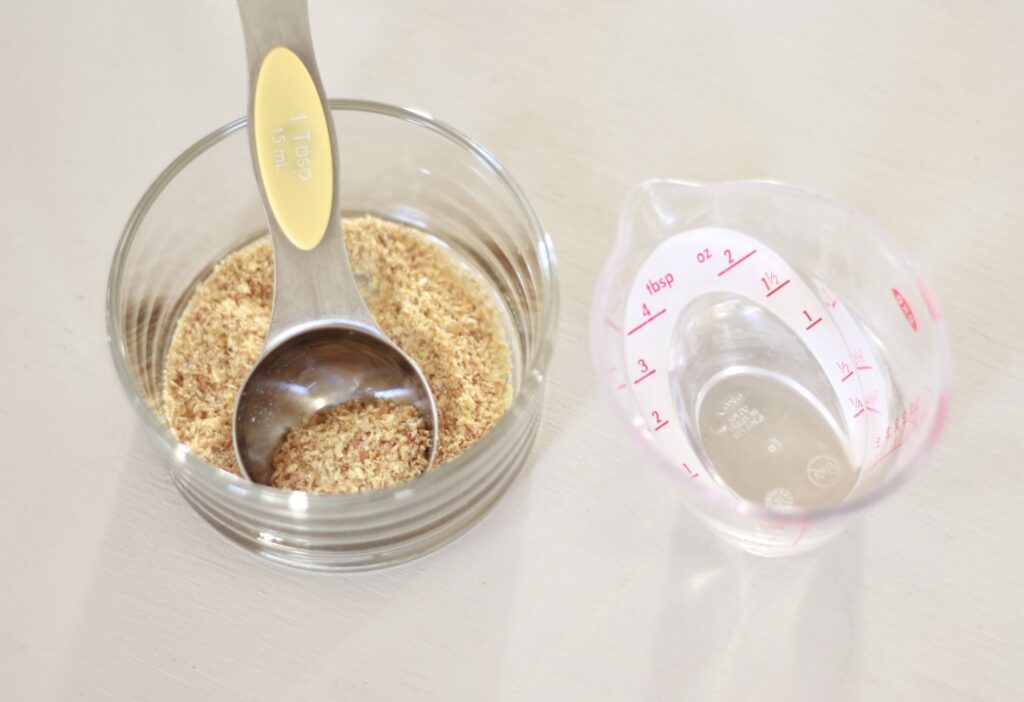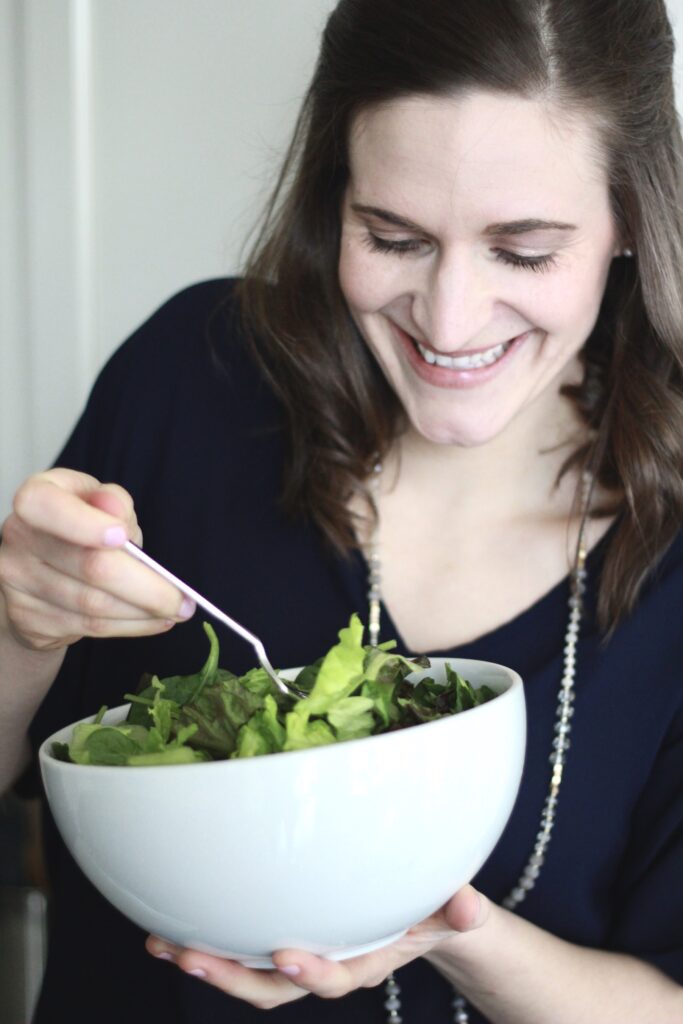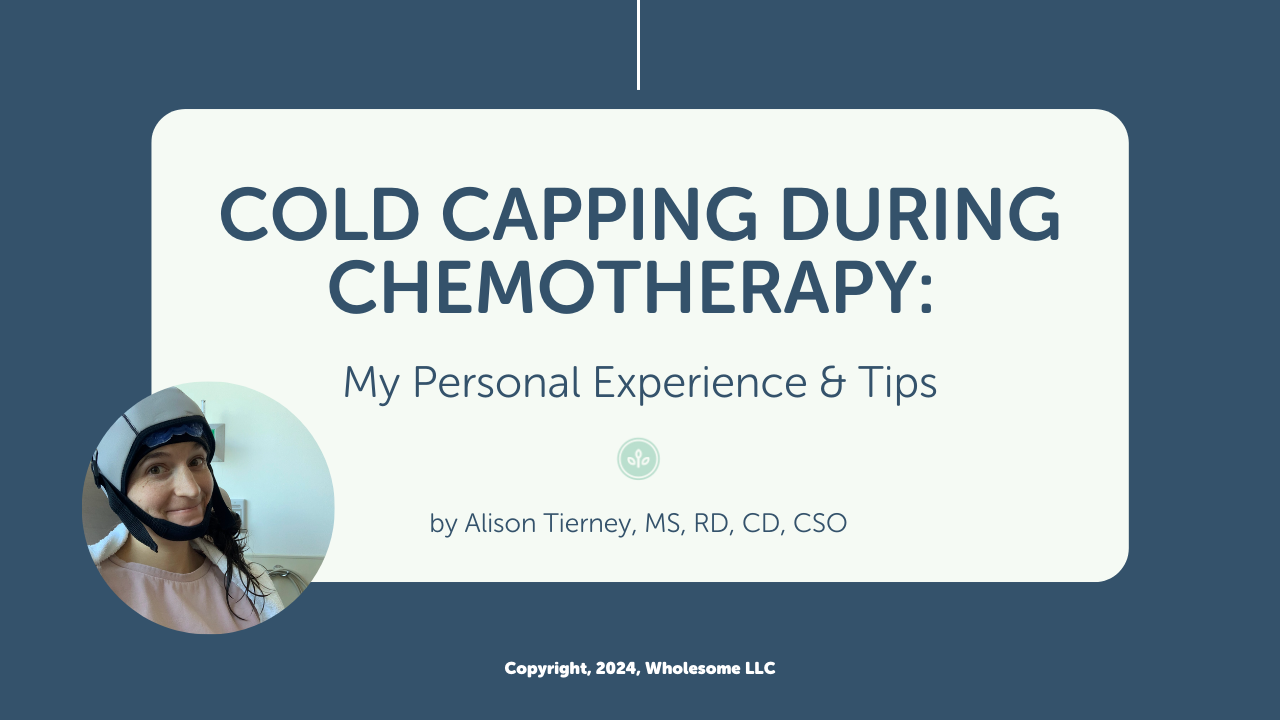The Wholesome Journey - Group Nutrition Coaching Program
Mentorship Program, 1:1 Nutrition Coaching with Alison
What do you want to learn more about?
Program Login
Podcast Features
May 2, 2019
Alison Tierney, MS, RD, CD, CSO
Alison is a registered dietitian, board-certified in oncology nutrition, and a cancer thriver. Her expertise in oncology nutrition and personal experience with her own cancer diagnosis and its treatment provide her with the unique perspective of being able to relate to her clients on an entirely different level. Her content is consistently focused on evidence-based guidelines and seeks to increase the awareness of the power of nutrition to complement traditional cancer therapies.
- Alison Tierney, MS, RD, CD, CSO
- Alison Tierney, MS, RD, CD, CSO
- Alison Tierney, MS, RD, CD, CSO
- Alison Tierney, MS, RD, CD, CSO
- Alison Tierney, MS, RD, CD, CSO
- Alison Tierney, MS, RD, CD, CSO
- Alison Tierney, MS, RD, CD, CSO
- Alison Tierney, MS, RD, CD, CSO
- Alison Tierney, MS, RD, CD, CSO
- Alison Tierney, MS, RD, CD, CSO
- Alison Tierney, MS, RD, CD, CSO
- Alison Tierney, MS, RD, CD, CSO
A close friend of mine likes to joke about my love for flaxseed and healthy bowel movements. Even though he may be joking, we both know there is truth to it.
I love flaxseed and I’m not shy to talk about bowel movements!
Beyond ground flaxseed being my favorite recommendation for constipation relief, it is also one of my top recommendations for cancer prevention AND management.
Flaxseed, a seed I describe as looking like a brown sesame seed, is well known for its rich source of omega-3 fatty acids. But what really sets flaxseed apart from other plant-based colleagues also rich in omega-3s (chia seeds, walnuts, hemp seeds, etc.) is their lignan content.
Lignans? (Lig – nan – s)
Lignans are a phytochemical known for its phytoestrogen properties.
Wait — phytoestrogen? Yes. Phytoestrogens tend to get a bad reputation they don’t deserve. I reviewed the research in this article.
Phytoestrogens were once thought to increase estrogen in the body, but the opposite is true. Phytoestrogens can reduce the effects of estrogen in the body and science has the research to prove it.

Flaxseeds and Breast Cancer
Flaxseeds contain nearly 100x more lignans than any other foods (1). Why do we care? Consumption of lignans is associated with significantly reduced risk of postmenopausal breast cancer (2).
Lignans themselves have been shown to directly reduce the growth of breast cancer cells, while in a petri dish (3). You’ve heard me say it before, and I’ll say it again — we are not petri dishes. However, this led to further research in humans.
The National Cancer Institute studied 45 women who had suspicious breast biopsies or had previously been diagnosed with breast cancer. They were to consume 2 teaspoons of ground flaxseed daily for 1-year. After 1-year, there were less precancerous breast cancer cells and 80% experienced a drop in a biomarker indicating cell growth (Ki-67 for my fellow ). (4)
Interested in more research?
- Breast cancer survivors who have higher levels of lignans in their bloodstream and diet have been shown to live significantly longer than those who do not. (5,6,7).
- Women who consumed muffins with flaxseed daily experienced a reduction in cell growth and increased cancer-cell death (8).
Overall, lignan intake in the form of flaxseed consumption is associated with reduced breast cancer risk and tumor growth.

Flaxseeds and Prostate Cancer
There is less talk about phytoestrogens and lignans when it comes to men’s health, I presume since it doesn’t seem related. However, the research in phytoestrogens for prostate cancer health is widely available.
Studies have found that lignans have been shown to reduce the growth of prostate cancer cells, in a petri dish (9). Again, what about in actual humans?
Men with prostate cancer were asked to consume three tablespoons of ground flaxseed daily. After a month of consumption, their tumors were examined and found to have reduced cancer cell growth and an increase in the rate of cancer-cell clearance–or, getting rid of cancer cells. (10)
Overall, ground flaxseed consumption has been shown to be a safe, low-cost, and effective method playing a role in the reduction of prostate cancer cells and cell growth (11). #hellonutritionwin
Expert Tips for Consuming Flaxseed
These days, many individuals are familiar with flaxseeds but are not necessarily familiar with how to include it regularly.
Here are my favorite tips for making flaxseed a regular star in your disease-fighting diet:
- Ensure you consume ground flaxseeds. We can’t necessarily absorb the nutrients from the seed if they are in the full-seed form. You can purchase them whole and grind in a coffee grinder, or purchase ground.
- Store your bag in the freezer. Since they contain omega-3 fatty acids, they can become rancid over time.
- Aim to consume one tablespoon per day, but feel free to start slow, especially if you haven’t included it regularly before.
An egg replacement in baking!
- Mix 1 tablespoon of ground flaxseed, 3 tablespoons of water and mix. Let it sit for 5 minutes. This is the equivalent of one egg.
You can add ground flaxseed to a variety of dishes, but here are my favorites:
- Oatmeal
- Smoothies
- Salad
- Marinara Sauce
- Baked Goods
Want to learn more about how we include this cancer-fighting food regularly?
Grab our FREE, 5-day Cancer Fighting Menu Plan complete with a grocery list, prep list, and our favorite recipes–some of which are exclusive to only the menu plan!
Let Us Know: What is your favorite way to include flaxseed in your diet?
References:
- Smeds AI, Eklund PC, Sjohlm RE, et al. Quantification of a broad spectrum of lignans in cereals, oilseeds, and nuts. J Agric Food Chem. 2007;55(4):1337-46.
- Buck K, Zaineddin AK, Vrieling A, Linseisen J, Chang-Claude J. Meta-analyses of lignans and enterolignans in relation to breast cancer risk. Am J Clin Nutr. 2010;92(1):141-53.
- Abarzua S, Serikawa T, Szewczyk M, Richter DU, Piechulla B, Briese V. Antiproliferative activity of lignans against the breast carcinoma cell lines MCF 7 and BT 20. Arch Gynecol Obstet. 2012;285(4):1145-51.
- Fabian CJ, Kimler BF, Zalles CM, et al. Reduction in Ki-67 in benign breast tissue of high-risk women with the lignan secoisolariciresinol diglycoside. Cancer Prev Res. (Phila). 2010;3(10:1342-50.
- Buck K, Vrieling A, Zaineddin AK, et al. Serum enterolactone and prognosis of postmenopausal breast cancer. J Clin Oncol. 2011;29(28):3730-8.
- Guglielmini P, Rubagotti A, Boccardo F. Serum enterolactone levels and mortality outcome in women with early breast cancer: a retrospective cohort study. Breast Cancer Res Treat. 2012;132(2):661-8.
- McCann SE, Thompson LU, Nie J, et al. Dietary lignan intakes in relation to survival among women with breast cancer: the Western New York Exposures and Breast Cancer (WEB) Study. Breast Cancer Res Treat. 2010;122(1):229-35.
- Thompson LU, Chen JM, Li T, Strasser-Weippl K, Gross PE. Dietary flaxseed alters tumor biological markers in postmenopausal breast cancer. Clin Cancer Res. 2005;11(10):3828-35.
- Lin X, Switzer BR, Denmark-Wahnefried W. Effect of mammalian lignans on the growth of prostate cancer cell lines. Anticancer Res. 2001;21(6A):3995-9.
- Demark-Wahnefried W, Price DT, Polascik TJ, et al. Pilot study of dietary fat restriction and flaxseed supplementation in men with prostate cancer before surgery: exploring the effects on hormonal levels, prostate-specific antigen, and histopathological features. Urology. 2001;58(1):47-52.
Health Benefits of Flaxseed for Cancer
Featured Articles
Wholesome LLC is not a medical practice, and its employees cannot offer medical advice. This website provides educational information but it is not a substitute for medical advice from a licensed medical professional who is familiar with your particular facts and circumstances. The information contained on this website is not intended to diagnose, treat, or cure any disease and shall not be construed as medical advice. The information and education on this website is provided for you to use at your own discretion.
You can further review our disclaimer here.
Wholesome
About Alison
Courses & Programs
The Wholesome Journey
Free Resources
FAQs
Press & Media
Recipes
Blog
Contact Us
Shop
© 2025 Wholesome, LLC All rights reserved.
Privacy Policy
Terms of Use
Disclaimer
Mobile Terms of Service


